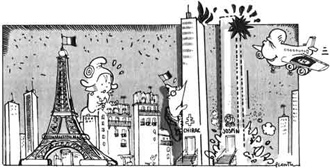Mabel Berezin
Illiberal Politics in Neoliberal Times: Culture, Security and Populism in the New Europe
Cambridge University Press
324 pages, 9 x 6 inches
ISBN 978 0521547840
Right populist parties have been gaining electoral clout in Europe since the mid-1990s. Right wing parties are not new to European politics. What is new is that parties that analysts had viewed as extremist and fringe are attracting sufficient numbers of votes to become part of legally constituted governing coalitions.
This is a surprising development. Post-war Europe prided itself on having learned the lessons of fascism and Nazism. The last threat to European democracy, Communism, collapsed when the Berlin Wall fell in 1989. What happened that allowed right wing parties to once more lurk on the European political landscape?
Illiberal Politics in Neoliberal Times argues that the acceleration of European integration that began in 1992 with the Maastricht Treaty—the neo-liberal project of the New Europe—is fueling the emergence of a new European right. It shows why and how market fundamentalism creates social insecurities that right wing political parties exploit to their advantage.
The book weaves together three stories: first, the story of the success of the French National Front in the period between 1995 and 2005; second the story of European integration in France and in Europe writ large; and lastly, the contrasting story of the right in other European countries.
Illiberal Politics in Neoliberal Times makes the novel argument that security is a core component of democratic practice. Early theorists of democracy understood that feeling safe in one’s political space was a cornerstone of democratic empathy that fueled cosmopolitan, rather than narrowly nationalist, imaginings. Contemporary theories of democracy have elided the discussion of security that was crucial to earlier formulations.
Europe as a fully realized political union threatens the link between democracy and security, broadly conceived as social, political and cultural, that was the cornerstone of post-war peace and economic progress. By moving the center of political gravity from the polity to the person, from the state to the market, Europeanization has compromised the bonds of democratic empathy and provided an opportunity for right populists to articulate a discourse of fear and insecurity.

If we think of the nation-state in terms of experiential and legal security, then we can conceptualize it as an arena that adjudicates risk for its members.
My work concerns democracy, culture and political engagement. Scholars usually analyze democracy through the study of liberal political regimes and movements or post-authoritarian transitions. In contrast, I have focused on illiberal politics to explore the conditions for democratic practices. I begin from the premise that we can learn much about democracy and democratization by exploring illiberal regimes—such as inter-war fascism—as well as the conditions under which illiberal or non-democratic movements emerge—such as in contemporary Europe.
My first book, Making the Fascist Self argued that Italian fascism principally rejected the split between the public and private self, the core of liberal democracy. It hypothesized that at particular historical moments certain social groups perceive the cultural bifurcation of a public and private self to be untenable and that political movements and parties that reject this split on cultural grounds gain political ascendance.
Illiberal Politics in Neoliberal Times revisits many of the claims about liberalism and illiberalism that I first explored in Making the Fascist Self. My new book is a cultural analysis of the populist response, particularly its right wing manifestations, to changing political and social environments of contemporary Europe.
The book argues that the right is primarily a response to changes in the nature and structure of the European nation-state and the way individuals situate themselves and are situated within the nation-state. If we think of the nation-state in terms of experiential and legal security, then we can conceptualize it as an arena that adjudicates risk for its members. To the extent that it contains threat and minimizes risk for its members, then it will be able to ensure a generalized type of democracy that brings democratic sentiments in line with democratic procedures.
The interconnected dimensions of Europeanization—the expanding processes of European integration, and of globalization—have altered the social and political landscape of contemporary Europe. Insecurity in both the public and private domain has been one response to these processes. Fear—of immigrants, crime, disease, unemployment, and now terrorism—has become a recurrent theme in European public discourse. Europeanization and globalization have fueled social and cultural anxieties that imbue the rhetoric of fear with emotional resonance as well as political salience. Although the European right is not alone in its evocation of insecurity, it has been the most effective in bringing the emotion of fear to the foreground of political discourse in Europe.
The summary point is that when the European nation-state begins to mutate, if not dissolve, due to the push of European integration and the attendant processes of Europeanization, then the evolving political space reconfigures both the social and cultural relations as well as institutional relations upon which the old nation-state had been built.

Illiberal Politics is a serious book on a serious topic. But it is also a lively book to read.
The French story, which occupies the 140-page middle section of the book, is replete with cartoons, newspaper images and photographs. And unlike many books on the European right, this book emphasizes context instead of the pronouncements of party leaders.
In the chapter on the National Front breakthrough in the 1998 regional elections, I also spend many pages discussing the 1998 World Cup Victory. The chapter on the 2002 Presidential election where Le Pen came in second place in the first round begins with a discussion of the popular film Amelie and how it figured in the mindset of French intellectuals and politicians. The chapter on the French rejection of the European constitution in 2005 deftly illustrates how citizens and politicians from all sides of the political spectrum converged in their antipathy to Europe.
There are 20 illustrations in the book. I will simply include here one of my favorites.
This cartoon appeared on the front page of Le Monde in April 2002 after the first round of the Presidential election when the National Front’s leader Jean Marie Le Pen received enough votes to proceed to the second round—the run off in American terms.
The French viewed Le Pen’s victory as a political earthquake and national disgrace. The cartoon not only reflects how upset the French were over Le Pen, or at least the editors of Le Monde, but also suggests that they had lost a sense of proportion. The election occurred in April 2002—less than a year after the events of September 11 in New York City. (Incidentally, in the immediate aftermath of 9/11 the cover of the French newspaper Le Monde proclaimed in solidarity, “We are all Americans!”) The cartoon depicts Le Pen as a Nazi pilot of a small plane toppling the twin towers of Jospin, the Prime Minister, and Chirac, the President. These two men were supposed to be the contenders in the run-off election—not Le Pen. The cartoon also suggests that Le Pen has toppled the foundations of French democracy and the Republic.

Most citizens live in the middle—not at the edges of either left or right. Political extremism of all stripes may generate violence and hatred—but it tends not to win elections. In that regard, I am extremely hopeful.
Having spent most of my career, researching and writing on illiberal politics, I am convinced that most citizens live in the middle—not at the edges of either left or right. Political extremism of all stripes may generate violence and hatred—but it tends not to win elections. In that regard, I am extremely hopeful.
The lessons of this book extend beyond Europe. In an age that appears replete with threats from global terrorism to financial crisis, leaders and citizens ignore the link between democracy and security at their peril. A thick democracy—that is, a democracy that merges democratic sentiments and institutions—is difficult. It is difficult because democracy requires not only wealth as a material foundation but also a generalized public sense of largesse and empathy. But these are aristocratic as opposed to populist virtues—not because the mass public is intrinsically intolerant, unjust and unfair but because it is frequently not in the ordinary person’s interest to voluntarily share scarce cultural and material resources.
Modern nation-states made democracy possible by providing citizens with an expanded notion of security—domestic and international. Security is an emotional and practical concept—much like honor in non-modern societies. Security was institutionalized in the major institutions of membership of the modern nation-state: the army, the schools and social welfare, as well as in targeting enemies and identifying friends.
The challenges to contemporary democracy lie in the new relation between security and insecurity, in all its forms—material, cultural and emotional—that globalization creates. Secure states are democratic states no matter where they are geographically situated. Unless modern polities confront that issue, populism will continue to lurk in the interstices of even procedurally democratic nation-states.




We don't put paywalls. We don't distract you with ads. We don't sell your data.
Please help to keep this running!